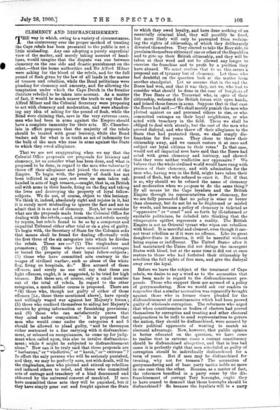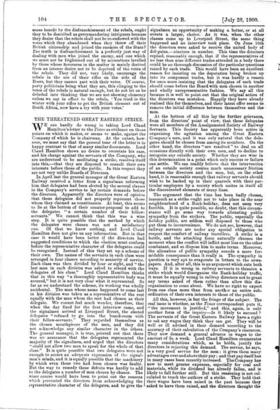CLEMENCY AND DISFRANCHISEMENT.
THE way in which, owing to a variety of circumstances, the controversy over the proper method of treating the Cape rebels has been presented to the public is not a little misleading. Any one adopting a purely superficial view of the matter, and merely taking account of head- lines, would imagine that the dispute was one between clemency on the one side and drastic punishment on the other,—that the home authorities and Sir Alfred Milner were asking for the blood of the rebels, and for the full pound of flesh given by the law of all lands in the matter of treason and rebellion, while the Bond. politicians were pleading for clemency and amnesty, and for allowing the temptation under which the Cape Dutch in the frontier districts rebelled to be taken into account. As a matter of fact, it would be much nearer the truth to say that Sir Alfred Milner and the Colonial Secretary were proposing to act with clemency and moderation, and were abandon- ing any idea of asking for the pound of flesh, while the Bond were claiming that, save in the very extreme cases, men who had been in arms against the Empire should have a complete immunity for their acts. Mr. Chamber- lain in effect proposes that the majority of the rebels should be treated with great leniency, while the Bond leaden ask for what is in truth an act of indemnity for the bulk of the men who rose in arms against the State to which they owed allegiance.
That we are not exaggerating when we say that the Colonial Office proposals are proposals for leniency and clemency, let us consider what has been done, and what is proposed to be done, in regard to the men who voluntarily threw off their allegiance and joined the enemies of the Empire. To begin with, the penalty of death has not been inflicted in any case, not even on men taken red- handed in acts of high treason,—caught, that is, on British soil with arms in their hands, firing on the flag and taking the lives and destroying the property of loyal fellow- subjects. We do not, of course, object to this leniency. We think it, indeed, absolutely right and rejoice in it, but it is surely most misleading to ignore the fact and. not to admit that it is an act of clemency. Next, let us consider what are the proposals made from the Colonial Office for dealing with the rebels --and, remember, not rebels merely by repute, but rebels found to be so by a competent and impartial Tribunal either after trial or on a plea of guilty. To begin with, the Secretary of State for the Colonies asks that means shall be found for dealing effectually with the first three of the six categories into which he divides the rebels. These are :—" (1) The ringleaders and promoters ; (2) those who have committed outrages or looted the property of their loyal fellow-subjects ; (3) those who have committed acts contrary to the usages of civilised warfare, such as abuse of the white flag, firing on hospitals, dcc." Men accused of these offences, and surely no one will say that these are light offences, ought, it is suggested, to be tried for high treason. But these are, of course, only a small number out of the total of rebels. In regard to the other categories, a much milder course is proposed. There are "(4) those who, though not guilty of either of those offences [i.e., those three mentioned above], have openly and willingly waged war against her Majesty's forces ; (5) those who confined themselves to aiding her Majesty's enemies by giving information or furnishing provisions ; and (6) those who can satisfactorily prove that they acted. under compulsion." It is proposed that men who would come under the categories 4 and 5 should. be allowed to plead guilty, "and be thereupon either sentenced to a fine carrying with it disfranchise- ment, or released on rec,ognisances, to come up for judg- ment-when called upon' this also to involve disfranchise. ment ; while 6 might be subjected to disfranchisement alone." Now can it be truly said that these proposals are "barbarous," or "vindictive," or "harsh," or" extreme " ? In effect the only persons who will be seriously punished, and they, we may be perfectly sure, not with death, will be the ringleaders, men who plotted and. stirred up rebellion and induced others to rebel, and. those who committed acts of outrage and treachery of a. kind denounced. and abhorred by the universal consent of mankind. If men have committed these acts they will be punished, but if they have simply gone out and fought against the State to which they owed loyalty, and have done nothing of an essentially criminal kind, they will possibly be fined, but more likely will only be prevented from reclaim- ing the rights of citizenship, of which they deliberately divested themselves. They elected to take the Boer side, to proclaim themselves citizens of one or other of the Republics and to give up their British citizenship, and they will be taken at their word and not be allowed any longer to exercise the franchise and to profit by a position they have abused. We must confess that to us this seems a proposal not of tyranny but of clemency. Let those who feel doubtful on the question look at the matter from another standpoint. Let us assume that in the end the Boers had won, and that it was they, not we, who had to consider what should be done in the case of burghers of the Free State or the Transvaal who, in spite of their citizenship, welcomed the British forces with open hands, and joined those forces in arms. Suppose that in that case the Boers had said:—'We shall merely punish the men who plotted against us and. procured others to rise, or who committed outrages on their loyal neighbours, or who acted with treachery in the field. These we shall be obliged to deal with sternly, but the rest of the men who proved disloyal, and who threw off their allegiance to the State that had protected them, we shall simply dis- franchise for five years. They chose to throw their citizenship away, and we cannot restore it at once and subject our loyal citizens to their votes.' In that case, would not all impartial men have said. that the Boers had acted with great clemency and leniency, and showed that they were neither vindictive nor oppressive ? We believe that the whole civilised world would have rung with praises of their clemency, and with admiration for the men who, having won in the field, might have taken their pound of flesh, but who refused to exact it. But if that is so, why should we be refused the name of clemency and moderation when we propose to do the same thing ? By all means let the Cape loyalists and the British Empire through its representatives show clemency, for we are fully persuaded that no policy is wiser or better than clemency, but do not let us be frightened or misled by words, and because a policy of clemency is ticketed as " oppressive " or " cruel " and so forth by ill-informed or excitable politicians, be deluded into thinking that the vituperative epithet represents a reality. The British Empire is not an Oriental tyrant who wipes out rebellion with blood. It is merciful and clement, even though it can- not treat rebellion as if it were no offence. Like its great daughter-State in America, it will be merciful without being supine or indifferent. The -United States after it had maintained the Union did. not deluge the insurgent States with blood, but at the same time it did not at once restore to those who had forfeited their citizenship by rebellion the full rights of free men, and give the disloyal sway over the loyal.
Before we leave the subject of the treatment of Cape rebels, we desire to say a word as to the accusation that has been made in regard to the disfranchisement pro- posals. Those who support them are accused of a policy of gerrymandering. Now we would ask our readers to remember that a similar accusation was repeatedly brought against those who in former times pleaded for the disfranchisement of constituencies which had been proved guilty of wholesale corruption. The reformers who urged that when constituencies or bodies of electors had proved themselves by corruption and treating and other electoral malpractices to be unfit to send representatives to govern the nation, they should be disfranchised, were accused by their political opponents of wanting to snatch an electoral advantage. Now, however, that public opinion is better educated on the question, we have come to realise that in extreme cases a corrupt constituency should be disfranchised altogether, and that in less bad. cases it is perfectly right that men scheduled as guilty of corruption should be individually disfranchised for a term of years. Bat if men may be disfranchised for treating, why not for treason ? The accusation of gerrymandering and of base party tactics holds no more in one case than the other. Because, as a matter of fact, the reformers benefited in a party sense by the dis- franchisement of corrupt Tory boroughs, ought they to have ceased to demand that those boroughs should be disfranchised ? So because the loyalists will in a party
•
sense benefit by the disfranchisement of the rebels, ought they to be described as gerrymandering intriguers because they desire that the rebels shall not be re-endowed with the votes which they abandoned when they threw off their British citizenship and joined the enemies of the State? rhe truth is disfranchisement is a perfectly just way of dealing with men who joined the enemy, and one which we must not be frightened out of by accusations levelled by those whose fierceness in the matter is mainly derived from an intense desire not to be deprived of the votes of the rebels. They did not, very likely, encourage the rebels in the use of their rifles on the side of the Boers, but they cannot part with their votes. Of course, party politicians being what they are, this clinging to the votes of the rebels is natural enough, but do not let us be deluded into thinking that we are not showing clemency unless we say in effect to the rebels, You tried in the winter with your rifles to get the British element out of South Africa, now have a try with your votes.'



































 Previous page
Previous page